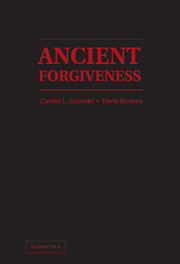Book contents
- Frontmatter
- Contents
- Contributors
- Preface
- Part I The Territory Philosophically Considered
- II Forgiveness Among The Greeks
- Part III Forgiveness Among The Romans
- Part IV Judaic And Christian Forgiveness
- 8 Mercy, Repentance, and Forgiveness in Ancient Judaism
- 9 A Man Had Two Sons
- 10 Jesus’ Conditional Forgiveness
- 11 Forgiveness in Patristic Philosophy
- 12 Forgiveness and Perfection
- Bibliography of Works Cited
- Index
- References
12 - Forgiveness and Perfection
Maimonides, Aquinas, and Medieval Departures from Aristotle
from Part IV - Judaic And Christian Forgiveness
Published online by Cambridge University Press: 05 January 2012
- Frontmatter
- Contents
- Contributors
- Preface
- Part I The Territory Philosophically Considered
- II Forgiveness Among The Greeks
- Part III Forgiveness Among The Romans
- Part IV Judaic And Christian Forgiveness
- 8 Mercy, Repentance, and Forgiveness in Ancient Judaism
- 9 A Man Had Two Sons
- 10 Jesus’ Conditional Forgiveness
- 11 Forgiveness in Patristic Philosophy
- 12 Forgiveness and Perfection
- Bibliography of Works Cited
- Index
- References
Summary
Maimonides and Aquinas employ extensive resources from Aristotle in their moral thought. Like Aristotle, they present perfectionist accounts of human nature and consider the virtues to be fundamental to moral life. They too regard intellectual activity as central to human perfection. And yet there are fundamental differences between Aristotle, on the one hand, and Maimonides and Aquinas on the other, and additional important differences between Maimonides and Aquinas. The differences made by Jewish and Christian theistic commitments show that neither Maimonides nor Aquinas should be described as “basically Aristotelian, with some religiously based modifications.” The present discussion brings into relief some differences between their views and Aristotle’s, with the aim of explicating their understandings of the nature, significance, and role of forgiveness. Topically, the discussion could, of course, be extended to include the Islamic tradition as well, but here our attention is confined to the Jewish and Christian traditions, examined through the thought of a key figure in each.
I
Some issues of moral psychology crucially important for Jewish and Christian thinkers did not arise for Aristotle or did not arise with the same significance. They include gratitude, repentance, and forgiveness. Each is related to God’s graciousness, that is, God’s offer of help to human beings by means of revelation and, in the Christian tradition, the offer of salvation through Christ. In Aristotle’s conception of an excellent and happy life there really is not a correlate to a wise, just, and merciful God whose providence governs the created order. In that respect the first cause in the Jewish and Christian faith traditions is radically different from Aristotle’s. Aristotle writes:
The person whose activity accords with understanding and who takes care of understanding would seem to be in the best condition, and most loved by the gods. For if the gods pay some attention to human beings, as they seem to, it would be reasonable for them to take pleasure in what is best and most akin to them, namely understanding; and reasonable for them to benefit in return those who most of all like and honor understanding.
However, the religious view relevant here is that a just and merciful God not only created the world but also offers help to human beings. Revelation offers guidance without which we would go astray and fail of perfection. It is part of God’s providential governance to offer help graciously to human beings in a manner, and for an end, differing from what is found in Aristotle’s conception of how the gods might influence human happiness. In the Christian tradition this need for divine assistance is heightened by the fact that human nature is fallen, wounded in a way such that it cannot heal itself. Also, in the religious view there is a place for imitatio Dei (imitation of God) in the conception of perfection in a manner not found in Aristotle’s view, and it is relevant to understanding forgiveness.
- Type
- Chapter
- Information
- Ancient ForgivenessClassical, Judaic, and Christian, pp. 216 - 236Publisher: Cambridge University PressPrint publication year: 2011



